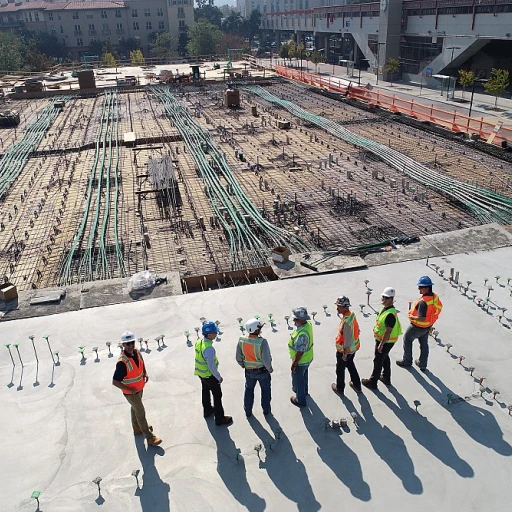
AI and the Changing Job Market
How the Job Landscape is Evolving
The integration of artificial intelligence into our professional lives is becoming more pronounced, reshaping the employment landscape in unprecedented ways. As AI technologies continue to advance, they're not only transforming existing roles but also spawning entirely new career paths. It's essential to understand these shifts as they present both challenges and opportunities for workers and industries alike.
A significant impact of AI on the job market is the automation of tasks that were traditionally considered labor-intensive or repetitive. This transition allows companies to streamline operations, reduce costs, and increase efficiency. However, it simultaneously raises concerns about job displacement and the future viability of certain professions. The roles most susceptible to automation often involve routine tasks, yet this technology is also being developed to handle more complex responsibilities, leading to a greater breadth of potential impact on various occupations.
Despite these challenges, AI is also heralding a multitude of opportunities for job creation in fields that didn't exist a decade ago. From AI ethicists and machine learning specialists to data analysts and cybersecurity experts, the demand for new skill sets is on the rise. The key to thriving in this new job market is an adaptable skill set tailored to the evolving demands of the AI economy.
Understanding how artificial intelligence is altering employment is crucial for navigating this dynamic landscape. For more insights into AI's influence on career prospects, explore how AI is changing the job scene.
As we delve deeper into the skills required for the AI era, it's critical to recognize that the future workforce will need to cultivate a blend of technical proficiency and timeless human capabilities, such as creativity and empathy. The emergence of AI-driven productivity doesn't negate the underlying need for a human touch in many job roles, which we'll explore further in subsequent sections.
Skills for the AI Era
Essential Skills in the Age of AI
As artificial intelligence continues to reshape the job market, individuals must cultivate skills that keep them adaptable and competitive in this evolving landscape. While some fear the AI-driven job displacement, the opportunity to thrive in the AI era largely hinges on acquiring new competencies. AI is not only automating routine tasks but also revolutionizing industries, demanding a workforce proficient in skills that complement technological advancements. One such critical skill set involves data literacy. With AI systems relying heavily on data, understanding and interpreting data is a non-negotiable asset. Professionals who can harness data-driven insights and leverage AI tools to make informed decisions will be decidedly valuable. Moreover, as AI emphasizes problem-solving and critical thinking, the ability to approach complex challenges with a creative mindset becomes crucial. These cognitive skills enable individuals to work effectively alongside AI systems, identifying opportunities for innovation and improvement while addressing unforeseen pitfalls. Furthermore, emotional intelligence stands out as an indispensable skill. While AI excels at analyzing data, it lacks the human ability to empathize and connect on an emotional level. Nurturing this human-centric skill allows employees to build stronger relationships, both within teams and with clients, providing a competitive edge that machines cannot replicate. Finally, continuous learning and adaptability are paramount. The rapid advancements in AI and technology necessitate a commitment to lifelong learning, enabling workers to regularly update their skills to match shifting industry demands. Embracing this growth mindset ensures individuals can navigate the fluid talentscape of the AI age, where change is the only constant. As we delve into the role of AI in productivity growth, it is clear that those positioned to leverage these skills will be pivotal in driving future economic prosperity.AI's Role in Productivity Growth
Enhancing Efficiency and Productivity Through AI
In recent years, the potential of artificial intelligence to transform productivity across industries has become increasingly apparent. As businesses integrate AI into their operations, they find that automation and advanced data analysis can lead to significant efficiency improvements. For many, this means streamlining processes that were previously labor-intensive and time-consuming.
One of the key advantages of AI is its ability to handle large volumes of data rapidly and accurately. This capability allows companies to make data-driven decisions with greater precision and speed, leading to better resource management and strategic planning. The use of AI in customer service, for example, can reduce response times and improve customer satisfaction by automating interactions and providing timely solutions.
AI's role in work automation cannot be understated. By assuming repetitive tasks, AI frees up human workers to focus on more creative and complex tasks that require critical thinking and problem-solving skills. As a result, employees can contribute more value to their organizations, leading to a more engaged and motivated workforce.
The integration of AI into various sectors also drives innovation, as companies are compelled to rethink their business models and explore new opportunities for growth. In sectors like manufacturing, logistics, and healthcare, AI-powered systems have demonstrated the potential to revolutionize operations, resulting in enhanced productivity and reduced costs.
However, as explored in previous discussions, it's crucial to recognize the balance required between AI's capabilities and human contributions. While AI can boost productivity, the unique qualities of human insight, empathy, and creativity remain indispensable in realizing its full potential. By fostering collaboration between AI technologies and the workforce, companies can navigate the complexities of an AI-driven future.
The Human Touch in an AI World
The Essential Element of Humanity in an AI Dominated World
As artificial intelligence continues to drive significant advancements across various industries, the human touch remains essential in shaping and enhancing our future work landscape. While AI technology reshapes the job market and propels productivity growth, it cannot replicate the emotional intelligence, creativity, and interpersonal skills inherent to humans. AI's integration into the workplace often augments, rather than replaces, human work, necessitating the development of new skills and roles. However, it’s the unique human characteristics that will continue to differentiate us from machines. Qualities such as empathy, compassion, and nuanced understanding in complex scenarios are areas where human intervention is irreplaceable. An organization's success in the AI era will hinge on its ability to harness AI's potential while leveraging the irreplaceable human touch that drives innovation and connects with consumers on a deeper level. For instance, customer service roles enhanced by AI can provide quicker and more efficient responses while still relying on human agents to handle sensitive and emotionally charged interactions. Ultimately, as discussed in previous sections, the symbiotic relationship between AI and human intelligence not only enhances productivity but also fosters a more dynamic and adaptable workforce. Emphasizing our distinctive human strengths will be crucial in maintaining a balanced coexistence with increasingly intelligent machines, ensuring that we remain at the heart of tomorrow's workplaces.Social and Economic Implications
Balancing Technological Advancements and Social Equity
The rapid integration of AI into the workplace brings with it a host of social and economic implications that extend beyond mere productivity gains. As discussed earlier, AI is reshaping the job market and necessitating new skill sets. However, it is crucial to address how these changes impact society at large, particularly in terms of equity and access.
One of the primary concerns is the potential widening of the gap between those who can adapt to the AI-driven economy and those who cannot. Workers in industries heavily reliant on manual labor or routine tasks may find themselves at a disadvantage, as AI systems are often more efficient and cost-effective in these areas. This shift necessitates a focus on reskilling and upskilling programs to ensure that all members of the workforce have the opportunity to thrive in the new economic landscape.
Economic Redistribution and Job Creation
While AI promises increased productivity, it also poses questions about economic redistribution. As companies leverage AI to boost efficiency, the resulting profits may not always translate into higher wages or better working conditions for employees. Policymakers and business leaders must work together to ensure that the benefits of AI are shared more equitably across society, potentially through measures such as progressive taxation or universal basic income.
Moreover, AI has the potential to create new job opportunities in fields that we may not yet fully understand. As we explored in the skills section, the demand for roles in AI development, data analysis, and ethical oversight is likely to grow. Encouraging innovation and entrepreneurship in these areas can help mitigate some of the job displacement caused by AI automation.
Ensuring Ethical AI Deployment
Another critical aspect is the ethical deployment of AI technologies. The potential for AI to reinforce existing biases or infringe on privacy rights is a significant concern. Establishing clear ethical guidelines and regulatory frameworks is essential to prevent misuse and ensure that AI serves the broader interests of society.
In conclusion, while AI offers numerous advantages, it also requires careful consideration of its social and economic impacts. By fostering an inclusive approach that prioritizes equity, education, and ethical standards, we can harness AI's potential to benefit everyone.












